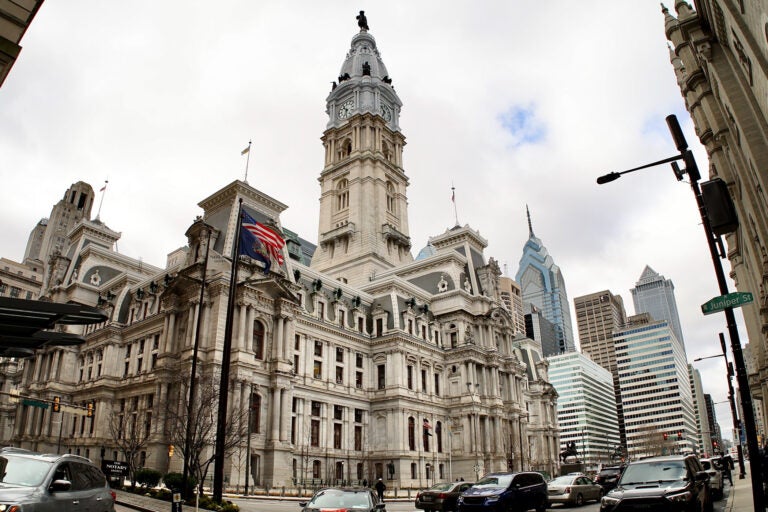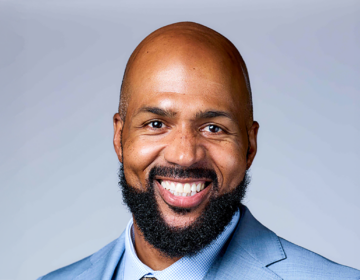Philly City Council hears from education advocates, who say Mayor Parker’s budget doesn’t go far enough
Community members testified about staff shortages and advocated for support for unhoused and immigrant students.

Philadelphia City Hall, northeast corner. (Emma Lee/WHYY)
From Philly and the Pa. suburbs to South Jersey and Delaware, what would you like WHYY News to cover? Let us know!
Philadelphia City Council heard hours of testimonies Wednesday from advocates, parents, school staff and students, who want more funding for city schools and demanded for the school district to receive a higher share of the city’s property tax revenue. Advocates also lobbied for expanded services to support homeless and immigrant students, a “chief of joy,” better staff retention, improved building conditions and more.
What’s happening with Parker’s promise to increase school funding?
Over a month ago, Mayor Cherelle Parker released her annual city budget proposal. Superintendent Tony Watlington presented the school district’s own budget plan shortly after, announcing a looming deficit and a plan to dip into 40% of the district’s reserves to stave off program cuts for one year. Philadelphia’s school district, historically underfunded by the state, is the only one in Pennsylvania not allowed to raise its own revenue. That leaves it largely dependent on state and city dollars.
Parker campaigned on a promise to raise the school district’s share of the city’s property tax revenue to 58%. Last year’s budget saw a bump from 55% to 56%, yielding $24 million. This year, the mayor’s budget proposes a 0.5% increase to yield $12 million — starting in fiscal year 2030.
Council has the power to vote for changes in the budget’s tax rates, but only a veto-proof majority can override the mayor. Parker indicated Tuesday that she would stand firm on her proposed timeline despite some council members pushing for a more rapid increase, saying she loved “the idea of doing more, but this is what we can achieve given all of the other demands on our city.”
On Wednesday, members of the public made their pitch to push for a greater increase anyway.
Donna Cooper, CEO of the advocacy group Children First, lobbied for a 1% bump in the coming year. She criticized the city’s move towards business and wage tax cuts in the budget proposal, arguing that school funding should come first.
“I don’t hear anyone clamoring for tax cuts,” Cooper said. “I am active in my neighborhood organizations and to a person, they want better schools.”
Cooper floated the idea of cracking down on police, fire and prison department overtime pay — which recently totaled about $250 million — by at least 10% to generate education funds.
Philadelphia Federation of Teachers President Arthur Steinberg also took to the mic, voicing the union’s support for “bold increases” in local and state funding. Steinberg, still in contract negotiations with the district, highlighted the staffing shortages that plague Philly schools.
“The district’s inability to recruit and retain staff impacts schools in just about every councilmanic district in the city,” Steinberg said. “We have nowhere near the number of counselors and behavioral health specialists needed.”
Sustaining programs for homeless students
Funding for a program helping homeless students is sunsetting at the end of this school year.
The district piloted a partnership with homeless support organizations in 2023, distributing $3 million in federal COVID relief funds to enable HopePHL, Eddie’s House and Valley Youth House to identify and assist homeless students. After those funds ran dry, the Board of Education allocated an additional $2.3 million to maintain the programs through June 2025. There’s currently no plan to renew the funding.
Ten thousand students in the district were identified as homeless in 2023, a 19% increase from the prior year.
Staff from the three organizations, district teachers and a student who benefitted from the services all took to the mic to request a budget allocation of $4.5 million over three years.
“Time is required to build a trusting relationship to allow us to address the many layers of complexity that families are dealing with,” HopePHL Project Manager Melissa Tsuei said. “Even the most dedicated school counselor and school personnel just don’t have the time to address the holistic nature of these issues.”
Jani Hayward, 19, described her experience finding support in Valley Youth House as a homeless student and new mother to her now-4-year-old child. Hayward said she was able to finally focus on academics when the group assisted her with food, clothing and transportation, as well as regular therapy and support. She later became a youth ambassador for Valley Youth House, visiting other schools and speaking with peers in similar situations.
“This support helped me regain my focus, set goals for myself and my future and gain a connection to my community,” Hayward said. “I am calling on you today to continue funding these programs to save our youth from this destruction.”
Councilmember Jamie Gauthier said that she would “definitely be supporting” the $4.5 million ask, calling it “critically important.” Council President Kenyatta Johnson also voiced his support.
“I would just hope that if we borrow a billion dollars for a housing plan, that at least we’re targeting and supporting homeless youth as a part of that program,” Johnson said, to applause from the chamber.
Boosting support for newcomers
Immigrant rights group Juntos took the lead in the calls for increased support for immigrant students, requesting $1.9 million for three additional newcomer programs and the reinstatement of the Multilingual Assessment Center, or MAC. Similar demands were presented to the school board in late February, when Juntos members and supporters packed the meeting and urged the district to increase outreach to immigrant families in light of ICE crackdowns.
During school district testimony the day prior, Councilmember Gauthier pressed Superintendent Watlington on the closure of the MAC.
“Last year, without warning, the district eliminated the Multilingual Assessment Center,” Gauthier said, describing the MAC as a “centralized hub” where immigrant families could access support and interpretation services, enroll children in school, and learn about district resources and expectations. “What are the district’s reasons for canceling this vital service? Where are newcomer families supposed to go to get these supports? And how much would it cost to bring back the MAC?”
Watlington responded that he didn’t have the information on hand.
“With your permission, I would like to take that as a homework assignment and respond on the record,” he said.
Carla Luna, a student in the district, spoke about newcomer programs — academic tracks for recently arrived students to acclimate and catch them up to speed.
“Right now, in a city filled with thousands of immigrants, there are only three newcomer programs in Philadelphia schools,” Luna said, adding that South and Southwest Philly, “some of the highest immigrant populated neighborhoods in the city,” are not home to any of these programs.
A ‘chief of joy’
Members of Lift Every Voice, a Black-led grassroots parent advocacy group, made the case for adding a full-time “chief of joy” to the district.
A core demand of the group is to address disproportionate discipline toward Black students. The joy chief would audit school culture, environment and practices across the district. They would be charged with expanding mental health support for children and phasing out “dehumanizing, anti-Black practices.”
“I see policies at my son’s school that are based on punishment as control as opposed to creating a classroom where everyone belongs or focusing on empathy,” said Julie Krug, a member of the group. “Punitive discipline, entire classes being denied recess for the actions of a classmate, and rules that don’t even allow snack breaks, even when lunch is scheduled as late as 1 p.m. These are not isolated incidents. They are systemic.”
During Superintendent Watlington’s testimony Tuesday, Councilmember Nicholas O’Rourke asked if the district had been considering the proposal for a “chief of joy.”
“We think that this is not the time to add new positions to the budget,” Watlington replied. “But certainly I’ve seen my role as superintendent, as being, in part, a chief of joy. And we are cascading that out through the deputy superintendent and the chiefs.”
Keisha Nicholson, a founding member of Lift Every Voice, supported an increase in the district’s property tax allocation.
“The district has already spent 40% of its reserves just to fund next year — that’s not a solution. We need a real plan, and a down payment on that plan. That means doing more. Shift the millage by another 2%,” Cole said. “Art, music, recess and a freedom for our kids to play, create and thrive: these are non-negotiables.”

Get daily updates from WHYY News!
WHYY is your source for fact-based, in-depth journalism and information. As a nonprofit organization, we rely on financial support from readers like you. Please give today.





